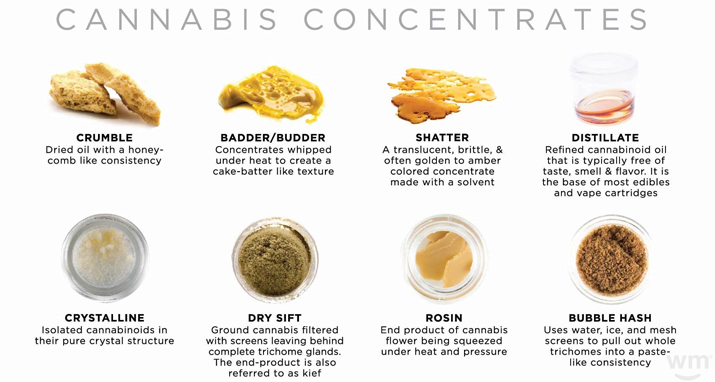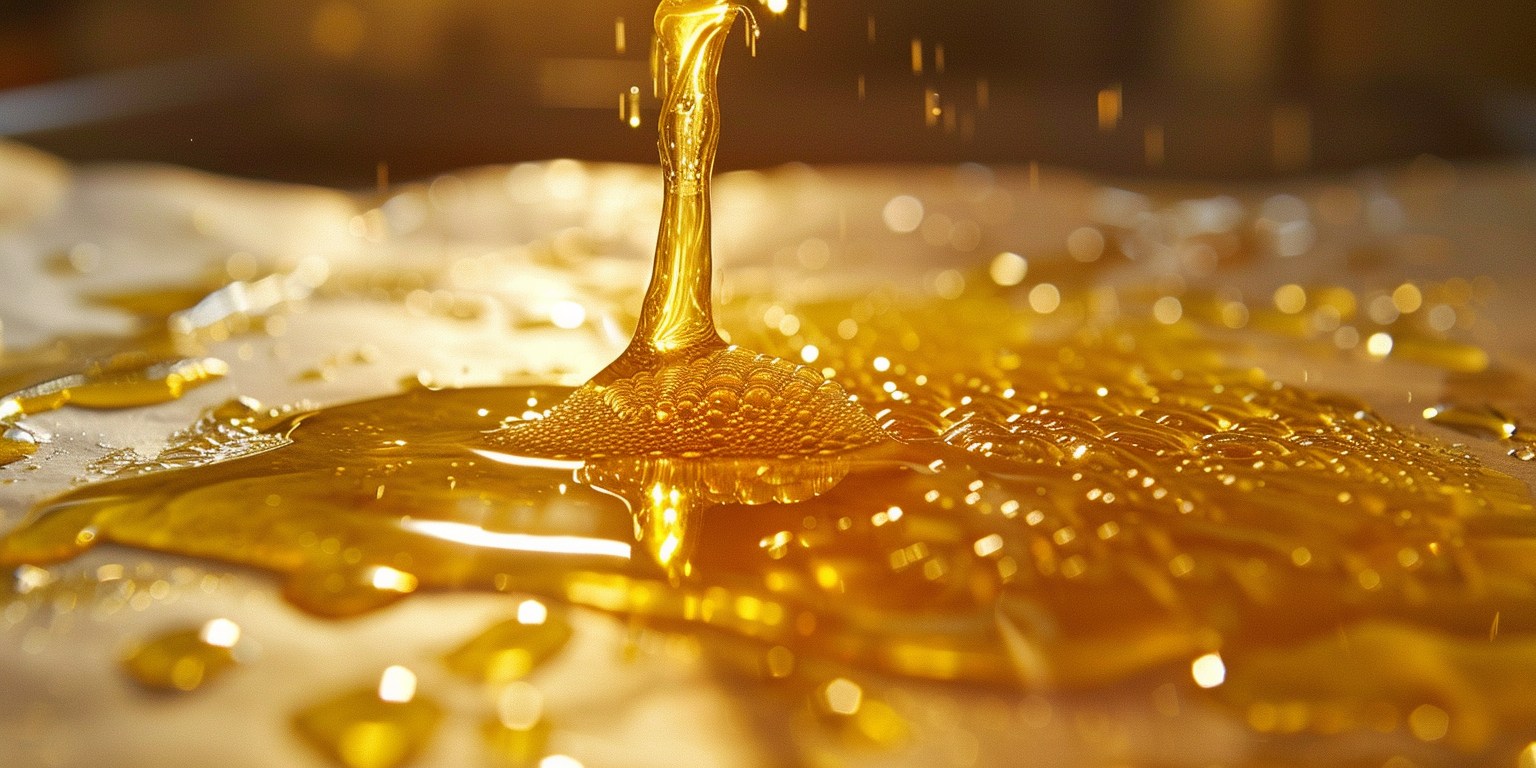Introduction
In recent years, cannabis concentrates have surged in popularity, becoming a preferred choice for both seasoned consumers and newcomers alike. Concentrates offer more potent effects, diverse forms, and efficiency, it’s no surprise that concentrates are growing in popularity.

But beyond just purchasing pre-made products, there’s a growing movement toward self-production of concentrates, particularly with the rise of user-friendly tools like rosin presses.
Taking control of your own concentrate production not only offers a more personalised experience but also ensures the highest quality and purity. In this blog post, we’ll explore why making your own rosin could be a game-changer and explain why it’s easier than ever to get started.
What Are Concentrates?
We’re almost certain that you know what concentrates are by now, especially if you’re here reading this article. However, just in case, and just to give you a recap we’ll touch on it again here briefly.
Concentrates are potent extracts of cannabis that contain higher levels of cannabinoids (like THC and CBD) and terpenes compared to traditional flower. These extracts come in various forms, such as wax, shatter, live resin, and rosin, each offering a unique experience.

The key appeal of concentrates lies in their potency; they provide a more intense effect with less material. This makes them both efficient and economical. For those familiar with cannabis, concentrates represent a step up in terms of both the experience and the control they offer.
Why Concentrates Are Beneficial
Concentrates offer several advantages over traditional cannabis consumption methods. First and foremost is the potency—concentrates allow users to achieve their desired effects with significantly less product. This is both cost-effective in the long run and easier on the lungs, as fewer inhalations are needed.
Cannabis concentrates provide a purer experience, free from plant material and other potential contaminants. For medicinal users, this means a more reliable and consistent dosage. For the recreational user, they can enjoy the heightened effects and flavours that concentrates bring.

In our view, transitioning to concentrates is a natural progression after becoming familiar with cannabis flower. Once your body adapts to the effects of THC and CBD from regular flower use, it may develop a tolerance to these effects. Jumping straight from never using cannabis to concentrates could be overwhelming due to their potency. While you would eventually acclimate, it generally makes more sense to start with flower and then move on to concentrates as your experience grows.
Why Rosin is a Great Form of Concentrates
Among the various types of concentrates, rosin stands out for several reasons. Unlike other concentrates that require solvents like butane or CO2 for extraction, you produce rosin through a solventless process, using only heat and pressure.
This not only makes rosin production safer and more environmentally friendly, but it also results in a product that is free from any residual solvents, preserving the full spectrum of cannabinoids and terpenes.
The purity of rosin translates to a cleaner, more flavorful experience, which is highly prized by connoisseurs and beginners alike. Without the interference of solvents or additives, rosin retains the full spectrum of cannabinoids and terpenes, offering a more authentic and potent representation of the cannabis strain.
This results in a richer, more nuanced flavour profile that enhances the overall experience. For seasoned users, the purity and quality of rosin provide a superior experience that allows them to fully appreciate the complexities of the plant. For beginners, the smoother and less harsh vapour offers an accessible introduction to concentrates, making rosin an excellent choice for those new to this form of consumption
How Rosin is Made
Making rosin is a relatively simple and straightforward process, which is one of the reasons it’s become so popular among cannabis enthusiasts.
The process involves applying controlled heat and pressure to cannabis flower, hash, or kief, which causes the resin glands, known as trichomes, to burst. Trichomes are the tiny, crystal-like structures on the surface of cannabis that contain the plant’s valuable oils, which include cannabinoids like THC and CBD, as well as aromatic terpenes.
When heat and pressure are applied, these oils are released and exude from the cannabis material, collecting on the parchment paper used in the process.
The key to successful rosin production lies in finding the right balance of heat and pressure: too much heat can degrade the cannabinoids and terpenes, leading to a lower-quality product, while too little pressure may result in poor yields.
Typically, you start the process by placing the cannabis material between two pieces of parchment paper and then placing it in the rosin press.
You heat the press to the desired temperature—generally between 160°F and 220°F (70°C to 105°C)—and apply pressure for a short duration, often just 30 seconds to a few minutes. As the press compresses the material, it squeezes out the oils, which collect on the parchment paper as a sticky, resinous substance known as rosin.
The simplicity of this method, combined with its solventless nature, makes it an attractive option for both home producers and connoisseurs who value purity and quality. You can use the resulting rosin in various ways, such as dabbing, vaping, or incorporating it into edibles, making it a versatile concentrate that fits a wide range of preferences and consumption methods.
Understanding the Mechanics of a Rosin Press
At its core, a rosin press uses two heated plates to apply pressure to cannabis material sandwiched between sheets of parchment paper. When users heat the plates to the appropriate temperature—typically ranging from 160°F to 220°F (70°C to 105°C)—and apply pressure, the heat liquefies the resinous oils within the cannabis, which are then squeezed out, leaving behind a clean, solventless extract known as rosin.
Customisation and Control
One of the primary advantages of using a rosin press is the level of control it offers. Manufacturers equip modern rosin presses with adjustable settings for both temperature and pressure, enabling users to fine-tune these parameters to achieve their desired results. Lower temperatures tend to preserve more terpenes, resulting in a more flavorful product, while higher temperatures can increase yields but may sacrifice some of the delicate terpenes.
Choosing the Right Press
When selecting a rosin press, users should consider factors such as plate size, pressure capacity, and ease of use. Larger plates can handle more material at once, making them ideal for bulk production, while smaller presses are more suited for personal use. The pressure capacity of a press is also crucial—more powerful presses can extract more efficiently, especially from dense materials like hash or kief.
Efficiency and Consistency
Another benefit of using a rosin press is the efficiency and consistency it brings to the extraction process. Unlike DIY methods that can vary widely in results, a good rosin press ensures consistent quality and yield with each use. This consistency is particularly important for those who consume rosin regularly or wish to produce rosin for medical purposes, where precise dosage and reliability are key.
Maintenance and Longevity
Maintaining a rosin press is straightforward, but essential for ensuring its longevity and consistent performance. Regular cleaning of the plates and other components prevents residue build-up, which can affect both the quality of the rosin and the functioning of the press. Additionally, keeping the press in a controlled environment—away from moisture and dust—will help maintain its condition over time.
The Benefits of Producing Your Own Concentrates
There are numerous benefits to producing your own rosin, starting with the ability to control the source material. When you make your own rosin, you can choose the exact strain and quality of cannabis used, ensuring that the end product meets your specific preferences and needs.
Additionally, producing your own rosin allows you to control the entire process, from the temperature and pressure used during extraction to the final consistency of the product. This not only ensures a higher level of quality but also provides a deeper understanding and appreciation of the concentrate-making process.
Plus, the knowledge and experience gained through self-production can lead to better results over time, as you refine your technique and experiment with different methods.
The Benefits of Getting into Rosin Consumption
Embracing rosin consumption opens up a world of possibilities. Rosin offers unmatched versatility among concentrates.. From exploring different strains and their unique terpene profiles to experimenting with various consumption methods, such as dabbing, vaping, or adding rosin to edibles.
Moreover, getting into rosin production allows you to develop your own techniques and systems, from the type of press you use to the specific temperatures and pressures that yield the best results for your material.
Additionally, the world of additives, such as terpenes, thickeners, and thinners, offers even more customization, allowing you to tailor your rosin to your exact preferences.
Whether you’re seeking the purest flavour, the most potent effects, or the perfect balance between the two, rosin gives you the flexibility to achieve it.
Conclusion
As the cannabis community continues to evolve, the appeal of concentrates, particularly rosin, continues to grow.
By taking control of your own production, you’re not only ensuring the highest quality but also gaining a deeper connection to the process and the product. With the right tools and a bit of practice, producing your own rosin can be both a rewarding and empowering experience.
Whether you’re a seasoned enthusiast or just starting your cannabis journey, there’s never been a better time to explore the world of rosin and discover the benefits of self-production.
Check out our range of rosin presses and accessories here

